Acknowledging that we have committed to climate catastrophe is not paralysis. Life is still rich after you accept that it will end.
—– Tim De Christopher, April 27, 2018
Whether the recent Pack Creek fire outside Moab was the product of a warmer world, or of an over abundance of burnable understory from decades of forest mismanagement, or whether it was the sole responsibility of a few idiots who walked away from a smoldering campfire, I had to wonder if it really even mattered.
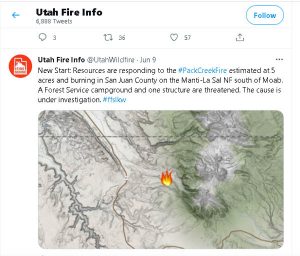
In 2021, I’m prone to embrace, if not enthusiastically, the more fatalistic view expressed by Tim De Christopher above. While this is far from a mainstream perspective, it’s my own belief that it is more important, even critical, to begin to deal with the impacts of an inevitably warmer world, rather than arrogantly assume we can alter the future via wind turbines, electric cars, and reusable grocery bags.
If the planet is getting hotter, we need to be smarter. And more honest. And more sensitive. Instead, the exact opposite is happening. We humans continue to maintain dual and competing realities–realities that make us dense and delusional at best, and lying hypocrites if we’re really honest about it.
On the one hand, I see hourly reminders of the apocalyptic future that so many predict for the planet as a consequence of climate change. Recent public opinion polls suggest that more and more of us have become “believers.” To suggest that one is a climate change skeptic is almost as dangerous a proposition as proclaiming affection for Donald Trump. It is part of our lexicon now. I fully expect to see “Climate Change Mattress Sales” in the very near future.
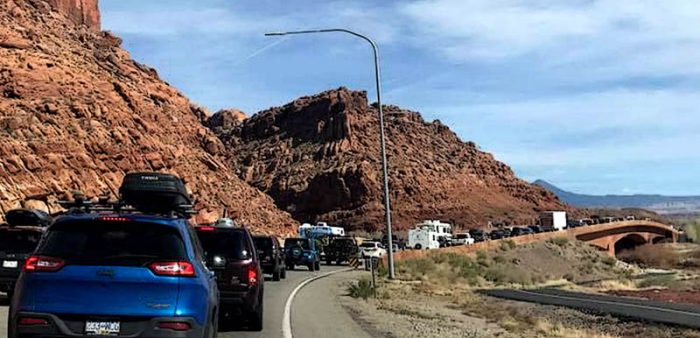
But in the real world, all our proclamations about being better stewards of the land border on the ridiculous. An embarrassing absurdity. A recent report from the US Energy Information Administration offered some hard facts about our country’s alleged embrace of “renewable energy.” The numbers tell a story that few want to hear. For example, as a percentage of total US production, we still rely on petroleum, natural gas, coal and nuclear for 88% of our energy needs. A paltry 12% comes from “renewables.” And it gets worse.
Of the energy production designated “renewable,” over 60% comes from biomass and hydroelectric power. Even Bill McKibben has been forced to denounce biomass as an unacceptable alternative to fossil-fuels, and the environmental community has been opposing most hydroelectric projects for decades.
So, while 12% is designated as “renewable,” about 4% of the total energy can be attributed to wind and solar. When I see the thousands of towering 600 foot turbine towers being constructed across the country–even Monticello, Utah has 27 of them built on a ridge above the community–and I realize what an inconceivable number of them would be needed to even make a dent in our growing demand, it all seems so futile.
During the recent heat wave in California, its governor urged the state’s 600,000 electric car owners to charge their vehicles only during off-peak hours. Those cars are less than 5% of the 15 million vehicles registered in the Golden State. But the state wants to eliminate sales of all fossil-fuel vehicles by 2035. How?
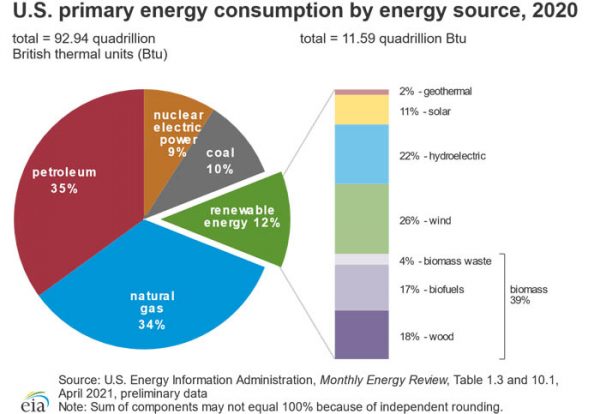
*** *** ***
In years and decades past, we worried about the toxic pollutants in the air and water. Many thought those chemicals would be the death of us all and and the ruination of our natural resources. Many scientists in the 1960s predicted an imminent planetary apocalypse. A half century later, those doomsday prophecies have failed to materialize. And thanks to the efforts of the Environmental Protection Agency (EPA) and the Clean Air and Clean Water Acts of the early 1970s, many of the toxic pollutants that marred America’s skies and waterways have been dramatically reduced. Since 1970, while the population of the US has increased by 130 million, pollutants like carbon monoxide, lead, sulphur dioxide, and nitrogen dioxide have declined, by an aggregate reduction of 70%.

But the challenge of Climate Change has little to do with these kinds of pollutants. The threat comes from the increase in Carbon Dioxide, which in fact, isn’t even a pollutant. But its increased concentration in our atmosphere is the concern that has preoccupied the world for the last decade. But it’s hardly a new subject. The NASA climate scientist James Hansen is often noted for raising the issue of Global Warming in 1988. Even earlier, in 1983, both the National Academy of Sciences (NAS) and the Environmental Protection Agency (EPA) addressed the issue of rising CO2 concentrations in the atmosphere and the catastrophic consequences they might have, decades into the future.
The NAS report was titled “Haste of Global Warming Trend Opposed,” and was stunning for several reasons. Keep in mind, this was written 37 years ago.
Here are key points from a New York Times article on the report:
1. A report issued today by the National Academy of Sciences says that the coming warming of the earth caused by a buildup of carbon dioxide in the atmosphere is ‘’cause for concern” but that there is sufficient time to prepare for its impact.
The academy’s report follows by three days a report by the Environmental Protection Agency on the warming phenomenon, known as the greenhouse effect.
2. The academy’s report warns that the greenhouse effect will cause a rise in global temperature in the coming century that has ”few or no precedents in the earth’s recent history.”
3. Like the E.P.A. report, the 496-page academy document warns that a rapid increase in the earth’s temperature and climate now seems inevitable and that its effects will begin to be felt by the turn of the century.
4. ”Viewed in terms of energy, global pollution and worldwide environmental damage, the ‘CO2 problem’ appears intractable,” the report said. Like the E.P.A., the academy also warned that the greenhouse effect was not likely to be prevented by reducing the use of coal and oil, the major sources of the carbon dioxide in the atmosphere.
5. Like the environmental agency, however, the academy found that since there is no politically or economically realistic way of heading off the greenhouse effect, strategies must be prepared to adapt to ”a high temperature world.” The E.P.A. report said even a total ban on coal would only delay the process for a few years.
6. ‘‘We may get in trouble in ways we have barely imagined, like release of methane from marine sediments,” as rising temperatures cause new effects, the report warned.
7. On the other hand, it said, carbon dioxide by itself should have a beneficial effect on agriculture by improving the efficiency of photosynthesis, the process by which plants create carbohydrates and hydrogen to nourish themselves.
8. It also said the benefits and damage stemming from climate change would fall ”unequally on the world’s people and nations” and could therefore be a new, divisive factor in world affairs
9. ‘The foreseeable consequences of climate change are no cause for alarm on a global scale but could prove to be exceedingly bad news for particular parts of the world,” the report concluded. ‘‘Generally, the more well-to-do countries can take in stride what may prove to be a reduction by a few percent in living standards that will likely be greater per capita by more than 100 percent over today’s.”
10. In the United States, the effect may be felt on agriculture starting around the year 2000, the report said. With warming of about 1 degree centigrade by then, the growing season in the northern part of the country would be about 10 days longer. In the southerly farm belt, where most of the country’s wheat, corn and soybeans are grown, drier conditions could decrease crop yields between 5 and 10 percent.
Click here to read the entire article.
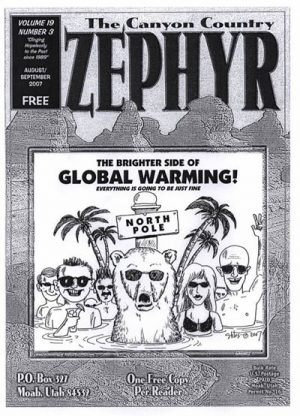
As recently as 2007, a quarter century after these reports were released, much of the news and sentiment on global warming/climate change still followed similar lines of thinking. The Zephyr even featured a cover story called, “The Brighter Side of Global Warming,” albeit a tad tongue in cheek, but we quoted these very serious sources regarding ways to deal with the changing climate:
NEWSWEEK magazine observed recently that, “with further warming seemingly inevitable, the farsighted are already thinking beyond combating climate change. By government fiat or market force, humans will adapt, and that will bring opportunities as well as challenges.”
It notes that, with rising temperatures, “Russia, long a half-frozen terra incognita, will find its interior frontiers thrown wide open as the Siberian tundra turns to fertile prairie.” Of course, the lower latitudes of the planet will be scorched, “but America and other rich nations will be left relatively unscathed, because they are removed from equatorial regions that will be hardest hit, and wealthy enough to adapt.”
According to NEWSWEEK, even parts of last year’s otherwise chilling report on global warming shined some happy light on the issue. British economist Nicholas Stern reported, “In higher latitude regions, such as Canada, Russia and Scandinavia, climate change may lead to net benefits through higher agricultural yields, lower winter mortality, lower heating costs and a possible boost in tourism.”
And according to Alaska Business Magazine, “…increasingly, Alaska may find potential trade and economic benefits from global climate change. According to Mead Treadwell of the Northern Forum, sea routes across the top of Russia will soon become practical alternatives to shipping freight from the Pacific Rim to Europe…In addition, receding sea ice is slowly showing hints of a long-sought-for Northwest Passage, through the archipelago of Canada’s far north. Alaska stands at the crossroad of these new trade routes.” Treadwell cautiously added, “However before cruise ships or freighters ply these routes regularly, strong political obstacles must be overcome.“
BACK TO 2021
The current global movement on climate change–which emphasizes that our only hope to save the planet is to reverse the increasing levels of CO2–is a recent phenomenon. Before this, the response was typically one of accepting and dealing with a warmer world. It’s just that most of us can’t remember further back in time than five years. While our current climate angst seems to have had us by the throats forever, the facts just don’t bear it out.
One thing is certain. While I harbor no deep affection for the oil companies that drill the wells and find the oil and refine it into gasoline so I can drive my car, I have a difficult time blaming them for all our woes. Recent lawsuits have tried to suggest that Big Oil knew about all these Climate risks, hid them from us, and kept feeding us oil anyway. And that as a result, they should be punished. The truth is, we ALL knew it. We were provided with the information, and we weighed those facts against the lifestyle we have chosen to lead. Five administrations, both Democratic and Republican, heard the same news. Exxon didn’t put a gun to my head every time I filled my tank. We all knew exactly what we were doing.

So here we are, racing rapidly into the second half of 2021. All anyone has to do is to look around, as we emerge from a year in hiding from COVID-19, and observe our own behavior. We act like caged animals who just broke out of the zoo— we flood the shops and stores and national parks, we spend billions of dollars on ‘stuff’ we don’t need, and we purchase new cars and bigger homes and faster, wilder vacations. We go crazy on Amazon. Our collective behavior is just slightly more insane than it was in 2019, the year before the pandemic. But the trend is clear. In short, we act in ways that will predictably assure the destruction of the most precious commodity we claim to love. Our planet. And this is happening now, not decades into the future when the full effects of climate change are supposed to strike us the hardest.
I think Wendell Berry said it best, years ago…:

“…this is what is wrong with the conservation movement. It has a clear conscience….To the conservation movement, it is only production that causes environmental degradation; the consumption that supports the production is rarely acknowledged to be at fault. The ideal of the run-of-the-mill conservationist is to impose restraints upon production without limiting consumption or burdening the consciences of consumers.”
While every good progressive environmentalist, worth his or her ever expanding carbon footprint, sheds tears and wrings hands over the coming global warming apocalypse, there is every reason to believe that other earthly degradations, at the hands of us humans, will beat climate change to the finish line long before rising sea levels and temperatures make life unbearable and unlivable. We’re doing such an excellent job of degrading the planet, we didn’t need Climate Change to help us along.
*** *** ***
Twenty years ago, long before climate change became the blame for all our woes, I watched a BBC special called “State of the Planet.” It was written and produced by the naturalist David Attenborough. In the three part series, he warned of the approaching “Sixth Extinction.” Attenborough noted that human activity was triggering a mass extinction “on a scale similar to that which killed the dinosaurs.” He made a compelling case and laid out, in his view, the five contributing human factors causing it.
Attenborough talked about habitat loss (via mass agriculture, mining and urban sprawl), introduced species, pollution ( in the form of contaminants, not CO2), over harvesting (depleting the oceans of its fish stocks for example), and islandization (the isolation of species as a consequence of over-development).

He never mentioned the increase in CO2 world-wide as a cause of the forthcoming Sixth Extinction. Not once. To Attenborough, there were already enough reasons to be concerned. “State of the Planet” never aired in the United States and even now can be found only on DVDs that play in Europe. A bootleg copy was recently removed from YouTube by BBC.
But watching the series two decades ago was seminal for me. For the first time, I understood that the real message of extinction wasn’t really about cataclysmic events, but about a slow but steady decline in the planet’s diversity. I refer here not just to biological diversity, but to the dwindling diversity of human thought as well. To the death of critical thinking. To the end of personal responsibility. To the dumbing down of our human civilization.
Because the film can’t be accessed, I’m working from memory, but I believe it was the biologist E.O Wilson who described a future in which the planet was occupied by four kinds of trees, three kinds of birds, and dogs and cats. He noted that if that’s a world you can live in, then “biologic impoverishment” is just for you.
But would anyone notice? In the future a hundred years ahead, would anyone care? Who reading this story still mourns the passenger pigeon? Or the moa? Or the dodo bird? They all went extinct in the last few hundred years. Had we finished off the last 200 buffalo in the 1890s, who would still grieve? Or would we put the once mighty beast on a postage stamp, dedicate a day of the year to its demise and go about our daily routine?
A recent Atlantic magazine article called “Why Americans Might Never Notice Climate Change’s Hotter Weather,” reports the findings of a study by the “Proceedings of the National Academy of Sciences.” Its conclusion…
“Americans’ sense of “normal” weather seems to reset about every five years, they found. People sent more weather tweets when it was unusually hot or cold outside, but their sense of what made for “unusual” weather was fairly shortsighted. Generally, if people had experienced an extreme temperature in the same month over the previous two to eight years, they were much less likely to tweet about it.
“This is a challenging finding for many climate advocates, because it suggests that people update their sense of normal weather faster than climate change will occur. In other words, many Americans will simply never detect that anything has gone wrong with the weather, at least on a day-to-day basis.”
I found an interesting climate change-related map not long ago. Pick a city from across America–what will that location’s climate be like in 60 years under a worst case “high emissions” scenario? The map will tell you. For example, if you live in Wichita, Kansas, 60 years from now, and if high emissions continue, its climate will feel like today’s climate in Lawton, Oklahoma. Salt Lake City’s climate in 2080 will feel like Red Bluff, California in 2019. Reno, Nevada will feel like Hurricane, Utah. Denver, like Borger, Texas. Farmington, New Mexico, like St. George, Utah in six decades. And again, under a high emissions scenario.
But again…who’s going to notice? Forests will burn, mostly due to our own stupidity. The changes that await future generations will be met with the same indifference that so many of our fellow humans view the planet now. If a century from now, the only trees that can survive on the La Sal Mountains are Black Locusts and Chinese Elms, who will remember the difference?
For some reason, I can’t get R.E.M’s apocalyptic tune, “It’s the end of the world…as we know it.” out of my head. It plays over and over. And for sure, the song will be repeated again and again, by each succeeding generation, as the world they knew vanishes before their eyes, and a new one takes its place.
And their sad lament will be just as ‘right’ as ours.
POSTSCRIPT: Just last week, another article appeared on my screen that gave even more credence to my assumptions. The headline, from LiveScience.com read:
“Society is right on track for a global collapse, new study of infamous 1970s report finds”
From the article:
“…a team of MIT scientists argued that industrial civilization was bound to collapse if corporations and governments continued to pursue continuous economic growth, no matter the costs. The researchers forecasted 12 possible scenarios for the future, most of which predicted a point where natural resources would become so scarce that further economic growth would become impossible, and personal welfare would plummet.”
The prediction from half a century ago was that we were already on our way to hard times, without the diversion of global warming, which has now bewilderingly placed all these other issues in a very deep hole.
Jim Stiles is Founding Publisher and Senior Editor of the Canyon Country Zephyr.
To comment, scroll to the bottom of the page.
Zephyr Policy: REAL NAMES ONLY on Comments!
Don’t forget the Zephyr ads! All links are hot!









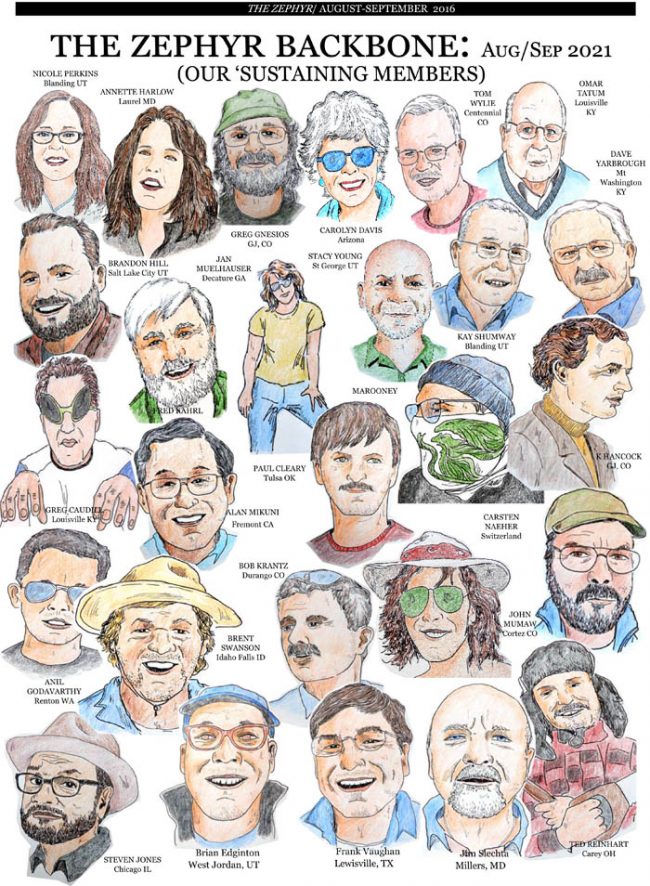
seems there is a “high” correlation of/about/whom people who still the elexion wuzz stolen == anti-vaxxers == and so on, including CCD (climate-change deniers). a person i know has stumbled onto a so-called book which not only nixes global-warming/climate-change but insists we’re in for a 30-year freeze! quite the summary, Jim, which gives us the proverbal (and, sigh, continued) pause 4 reflexion …
still THINK the elexion … (too bad i can’t go in & edit)
The sad truth is that your article is only the optimist’s perspective. All of the things mentioned are cases of “when”, not “if”. It’s only a matter of time. How much is anybody’s guess, but it sure does look to be a heckuva lot sooner than any inconceivable future that will always be years away. Reverse global warming? Fat chance. Technology will save us from ourselves? Don’t make me puke! What else can I say to make Jim sound cheery? Here it is: Homo sapiens, creation’s biggest mistake.
What came immediately to my mind while reading this article about the hard truth of the inevitable is a cartoon some years ago in the New Yorker which had a drawing of a Toyota Prius and a caption that said something to the effect that it was an example of “conspicuous non-consumption”.
More people, more consumption? There are no signs that it will stop as the less “developed” countries rush headlong into emulating the American consumer dream and the headlong rush into the inevitable future that will seem normal when that future arrives.
“The prediction from half a century ago was that we were already on our way to hard times, without the diversion of global warming, which has now bewilderingly placed all these other issues in a very deep hole.”
No bewilderment, pal. Our species – and our species alone – has caused global warming. Global warming is not some naughty cartoon figure menacing earth. It is not a metaphor. It is deadly – and our species continues to add to it. We are at fault. Only we can change what we are doing, what we are consuming. And, global warming will outlive contrarianism.
I hope i misunderstand your statement.
Yes, “pal,” you seem to have completely missed my point. The gist of the article is that for decades, humans have found so many ways to destroy the planet that by the time we experience the longterm effects of climate change, there won’t be much left of value to worry about. No one else seems to be having a problem grasping that central point. Sorry you were confused.
“When the situation is hopeless there’s nothing to worry about.
– Edward Abbey
On the other hand, people have been predicting the Impending Apocalypse since the beginning of language and society. In olden times, those foolish, scientifically ignorant people constructed theological doomsday scenarios. Now, we have largely foolish, scientifically ignorant people still panicked over the newest doomsday with theological fervor.
Of course, THIS time will be different, because we are clearly smarter than 10,000 preceding generations and we have chosen uniquely infallible authorities to guide us. But what is not different is that those authorities, as constant through time, have their own agenda, as do most splintered tribes within our collective society.
With the human species and modern society collapse one day? Perhaps, but Paul Ehrlich already lost his bet, and the smart money is on Steven Pinker. I suppose that those of you who just don’t like people (especially all of THOSE people), you can keep betting on black.
It appears to me that a bet on black is a moot bet. Look around, black is already here and the smart money is betting that it will get blacker in any number of imaginable and unimaginable ways. This is not a drill, those contemporary “scientifically ignorant people” you speak of are not peddling “theological doomsday scenarios”. They’re simply documenting and calling attention to a slippery slope as the angle increases and our speed down said slope increases as well.
Re Steven Pinker’s dreams of political policy solutions to climate change, have you watched C-span lately or have you visited China recently?
I’m confused by your remark that the smart money is on Steven “how does he still have those locks!?” Pinker. What position of his is the one to which you refer? (It’s an honest unsnarky question in case the tone is distorted by the internet…)
I mean the fundamental conclusion offered by Pinker and colleagues that the long term trends in human conditions have consistently improved through time and are very likely to continue that way. And that a subset of people, that Pinker refers to as “progressophibics” will always see the present and future in the worst possible way.
Thanks Bob for the clarification. All the smoke around here has fogged my brain…
Full disclosure: I am not the betting type, but I think I’d be one of those always laying their chips on black…
Theodor Adorno, the Marxist German philosopher, once said that despair is the final ideology. But he also said happiness–which for him is bound to both some past joy and a better future–is for the stupid. I can’t recall what he said about hope. But this was a man who got married because he was afraid of riding the streetcar alone, or so a friend of his said.
Onward–we have no choice.
The phenomenon of the “shifting baseline”–mentioned here in the fact that people’s understanding of a normal climate resets every 5 years or so–is a devilish one. Think about what people now think of as unspoiled nature. Here, in BC, I spent a few days at a “wilderness” lodge. It was awful. The view was dominated by a massive clearcut. (It was awful for other reasons as well, like the giant trucks that trundled by every 30 minutes delivering ore from the massive mine out there in the wilderness.) No one else seems bothered by these distractions, and the Tripadvisor reviews were stellar!
In any case, I was going to post this in response to the pack creek ranch fire article, but here is just as good: perhaps wildfire can help with industrial tourism. It clearly is impacting it: https://www.nytimes.com/2021/08/06/travel/wildfires-tourism-travel-west.html
Prescribed burns to curb tourism? Perhaps another “sustainable” solution?
Some days, or weeks–like this one with another “heat dome” and 90 degree heat here in Vancouver on the horizon–I do feel hopeless. But I still worry, no matter what Edward Abbey said!
Had a couple professors in the mid ’70s teaching “Limits To Growth” It stayed with me, sunk in deep. None of my friends then took it seriously, thought I was a weirdo.
From the LiveScience article: “Effectively, humanity can either choose its own limit or at some point reach an imposed limit, at which time a decline in human welfare will have become unavoidable.”
From the rearview mirror “Objects may be closer then they appear”
Yes indeed, the warning in the rear view mirror. According to the latest news from the usual unreliable sources, Phoenix has earned the “honor” of being the fastest growing city in America and has passed Philadelphia and is now the fifth largest City according to the latest census. To paraphrase Ed Abbey, Phoenix operates with the philosophy of the cancer cell which is unlimited growth.
In other news, Lake Mead, which provides jillions of acre feet of Colorado River water via the Central Arizona Project to Phoenix ,Tucson, and the wasteful flood irrigation agriculture in between, is a few days away from having automatic reductions in withdrawal kick in for Arizona and the six other states that use the water.
Those objects in the rear view mirror are not just, “closer than they appear”, they are passing us like we’re standing still.
I fear for my grandchildren. It does seem hopeless. Interesting article.
I can’t give up, I have children! One solution is to call or write your senators and representatives and tell them your concerns, tell them to go big on climate change by enacting a price on carbon.
Citizens Climate Lobby (https://citizensclimatelobby.org/) has been working for a decade to get the “Energy Innovation and Carbon Dividend Act” (https://energyinnovationhttpsact.org/) into law, recently it has been re-introduced. Talk to your friends, family, outdoor companies to endorse the act and encourage a price on carbon. Don’t give up, take action!
Everything is going to become unimaginably worse, and never get better again. If I lied to you about that, you would sense that I’d lied to you, and that would be another cause for gloom. – Kurt Vonnegut, Jr.
As an eternal optimist I quote Thomas Wolfe, “You Can’t go Home Again.” We’re too far gone. We’ve effed up the effing planet too much to regain equilibrium no matter what course of action we choose. We’re going the way of the dinosaurs by way of our own manmade catastrophic comet. People can argue ad infinitum about the whys & wherefores & solutions. But that doesn’t change the inevitable destruction of life as we know it one hair. We may have the technology, but politics will always manage to defeat all solutions. This rant won’t help a damn thing. But it sure felt good to say what’s been on my mind for decades. Here’s the optimistic part. My motto from an old Schlitz beer commercial, “Grab all the gusto you can cause you only go round once in life.”
A friend from southeastern Idaho just stopped by on his way to photograph Fall colors in the Colorado high country. There must be something wrong with me to have so much joy in this beautiful earth even when crowds invade my privacy in southeastern Utah. I think that humans have the capacity to build a kinder, gentler civilization that is less focused on obtaining more comfort and stuff they don’t need or in many cases even use. No doubt that view is a reflection of the childhood I enjoyed in the 1930s and 1940s when families I knew were poor but happy.
I really admire the ability that Jim has to concentrate on a subject and cause me to think about it in a balanced way.
to a more-than-diminutive capacity, i too believe what Kay has written. my parents were kids of the ’30’s and to whatever degree they could, they imparted the (“less focused on obtaining more stuff”) and carpe diem to their kids. i try to stop and marvel at the clouds and at distant horizons (and at the night sky) several times a day … but (sigh), often it ain’t enuff ~ the thing Jim has as the ‘subject’ may, (and i hope i’m wrong) be simply that we should have whirled-wide embraced and abided by: ZPG sometime before this …